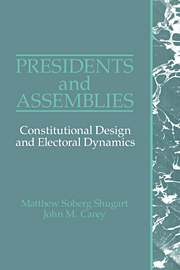Book contents
- Frontmatter
- Contents
- List of tables and figures
- Acknowledgments
- 1 Basic choices in democratic regime types
- 2 Defining regimes with elected presidents
- 3 Criticisms of presidentialism and responses
- 4 The premier-presidential and president-parliamentary experiences
- 5 The constitutional origins of chief executives
- 6 Constitutional limits on separate origin and survival
- 7 Legislative powers of presidents
- 8 Assessing the powers of the presidency
- 9 Electoral dynamics: efficiency and inefficiency
- 10 Electoral rules and the party system
- 11 Electoral cycles and the party system
- 12 Electoral cycles and compatibility between president and assembly
- 13 Conclusions
- Appendix A Electoral rules for one-seat districts and coalition-building incentives
- Appendix B Theoretical explanation for models predicting number of parties in presidential systems
- Bibliography
- Index
12 - Electoral cycles and compatibility between president and assembly
Published online by Cambridge University Press: 05 June 2012
- Frontmatter
- Contents
- List of tables and figures
- Acknowledgments
- 1 Basic choices in democratic regime types
- 2 Defining regimes with elected presidents
- 3 Criticisms of presidentialism and responses
- 4 The premier-presidential and president-parliamentary experiences
- 5 The constitutional origins of chief executives
- 6 Constitutional limits on separate origin and survival
- 7 Legislative powers of presidents
- 8 Assessing the powers of the presidency
- 9 Electoral dynamics: efficiency and inefficiency
- 10 Electoral rules and the party system
- 11 Electoral cycles and the party system
- 12 Electoral cycles and compatibility between president and assembly
- 13 Conclusions
- Appendix A Electoral rules for one-seat districts and coalition-building incentives
- Appendix B Theoretical explanation for models predicting number of parties in presidential systems
- Bibliography
- Index
Summary
We have seen how presidentialism permits a nationally endorsed executive while still allowing the representation of minority or regional interests to be expressed through the assembly. We have also seen that premier-presidentialism entrusts presidents, with their electoral mandate, to form a government, but only if the government can hold the confidence of the assembly. There are, of course, no guarantees that the president's party or coalition must hold a majority of seats. This chapter will consider electoral cycles in presidential and premier-presidential regimes and how they may effect patterns of governance. The longest-lived premier-presidential regimes (e.g., France and Finland) have had their elections and terms for president and parliament on wholly different cycles, as have some presidential systems (e.g., Chile before 1973 and the current regime of Korea). Presidents in such systems are elected for longer terms than are parliaments, although in most of the premier-presidential systems the president has the option to dissolve parliament and call new elections. In France, the president also may shorten his own mandate and call a new presidential election. Even when such options exist, an important characteristic of actual premier-presidential regimes is that there is no constitutionally prescribed harmony in the timing of elections and therefore terms, despite the importance that electoral cycles were shown in Chapter 10 to have. Under the nonconcurrent cycles and varying-length terms used in these systems, some assemblies are likely to be elected in the president's honeymoon and others at midterm or late in the term.
- Type
- Chapter
- Information
- Presidents and AssembliesConstitutional Design and Electoral Dynamics, pp. 259 - 272Publisher: Cambridge University PressPrint publication year: 1992

